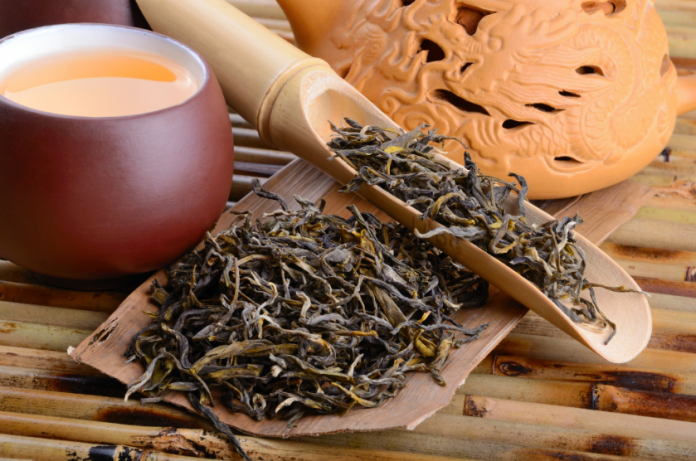
Coffee drinkers, listen up. Your deep dedication and attraction to a cup of joe is noted and notable, partly because it has been credited with many health benefits. However, there’s another beverage that bears deep consideration. No, it’s not just any cup of tea-it’s not even green tea. So which tea should you drink to start each day?
Oolong tea. This often neglected and skipped over variety of tea possesses some extraordinary characteristics that you may be missing if you don’t already make this tea a part of your day, especially first thing in the morning.
What is oolong tea?
Oolong tea comes from the same plant (Camellia sinensis) that black, green, and white tea are derived from, but the difference is in how each of these teas are processed. Black tea is fully fermented, green tea and white tea are unfermented, and oolong tea is partially fermented.
Like other teas that come from C. sinensis, oolong tea contains some caffeine (although the amount can differ with each batch), which acts as a stimulant of the central nervous system. Oolong tea also contains the chemicals theobromine and theophylline, which are similar to caffeine.
When it comes to caffeine, both green and oolong teas contain between 10 to 60 milligrams per 8-ounce cup, which compares with 70 to 130 mg of caffeine per 8-ounce cup of coffee.
Read about the surprising health benefits of 7 types of tea
Benefits of oolong tea
People around the world have recognized oolong tea for its many health benefits. Here are just a few of the ways oolong tea can improve your life, especially if you start every day with a cup or two. Another way to enjoy oolong tea is cold, perhaps with a little bit of lemon, and sipped throughout the day.
Boosts cognitive awareness. If you are looking for a way to sharpen your thinking skills and stay mentally alert, then be sure to begin each day with a cup of oolong tea. This variety of tea contains less caffeine in general than black tea but more than green or white, so if you are highly sensitive to caffeine, keep this in mind.
Provides great nutrients. Who doesn’t love the antioxidants present in tea, and oolong is no exception. This tea also provides lots of vitamins and minerals, including but not limited to vitamins A, B, C, E, and K as well as calcium, copper, manganese, potassium, and selenium.
Listen to more about summer teas
May help prevent cancer. Some evidence exists to show that women who regularly drink black, green, or oolong tea seem to have a significantly lower risk of developing ovarian cancer. One study named 2 or more cups daily as the number that seems to reduce the risk by nearly half. The polyphenols in oolong tea also assist in stopping the development of skin cancer.
Promotes heart health. Oolong tea has been shown to reduce lipid levels (cholesterol and triglycerides) in individuals who have abnormally high levels of these substances (dyslipidemia). In one study that compared black, green, and oolong teas, green tea had the largest effect on the risk of dyslipidemia, but only oolong tea reduced the levels of all of the lipids–total cholesterol, low-density lipoprotein (LDL) cholesterol, and triacylglycerolemia-and improved high-density lipoprotein (HDL) cholesterol.
Assists with weight loss. In a mouse study, those who received oolong tea extract while they were on a high-fat, high-sugar diet gained less abdominal fat than mice who ate the same diet but did not get the extract. When oolong tea was given to overweight and obese adults, the results were similar. More than 50 percent of the participants who consumed 300 milliliters of oolong tea four times a day lost more than 2.2 pounds after six weeks.
[Editor's Note: Our sponsor, Bigelow Tea makes a lovely Oolong tea. All of these health benefits were researched by Naturally Savvy.]
Sources
He R-R et al. Beneficial effects of oolong tea consumption on diet-induced overweight and obese subjects. Chinese Journal of Integrative Medicine 2009 Feb; 15(1): 34-41
Heber D et al. Green tea, black tea, and oolong tea polyphenols reduce visceral fat and inflammation in mice fed high-fat, high-sucrose obesogenic diets. The Journal of Nutrition 2014 Sep 1; 144(9): 1385-93
Lee AH et al. Tea consumption reduces ovarian cancer risk. Cancer Epidemiology 2013 Feb; 37(1): 54-59
Metropulos M, Ware M. What are the health benefits of oolong tea? Medical News Today 2017 Sep 6
Yi D et al. Reduced risk of dyslipidaemia with oolong tea consumption: a population-based study in southern China. British Journal of Nutrition 2014 Apr 28; 111:1421-29










